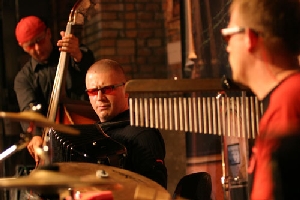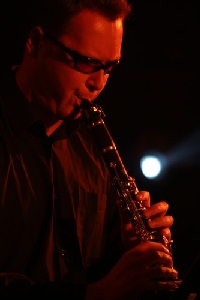
Klezzmates @ FolkWorld: FW#34, FW#35
Two Faces Of Klezzmates
FolkWorld Issue 35 02/2008; Article by Eelco Schilder
The Klezzmates
The Modern Sound of Klezmer
The Polish band Klezzmates have recently issued their second CD. Their music is rooted in Klezmer music, but it is mixed with many other influences and styles including jazz and classical sounds. Their music has a very distinct style and in order to find out whether they are a real Klezmer band and to give a brief introduction to the band, I interviewed contrabassist Jarek Wilkosz, who has been part of the band since the very beginning.
Jarek Wilkosz is the contrabass player of the band. Before telling us about the band’s history, he first gives a brief history of his early steps in music.

Klezzmates @ FolkWorld: FW#34, FW#35 Two Faces Of Klezzmates |
In the family I grew up in, making music was not part of the daily routine, but music accompanied me from the beginning. My parents are real music lovers and in our house you could always hear different styles of music, varying from classical music to rock and roll. Chopin, Beethoven, Rolling Stones or Dire Straits: I have known them all from my early years on. Nevertheless, I did not dream of becoming a musician until much later. As a matter of fact, although I attended piano lessons in my childhood and I still play the guitar as a hobby, I only started going to a “real” school of music when I was sixteen years old. It was my own decision, but my parents helped me and supported my efforts. I would like to add that in those days I attended the mathematics-physics class at secondary school, not really a music related subject. I chose the contrabass mainly by accident. When I passed my exams for the school of music, they suggested that I would take up playing the contrabass or trombone. I had a strong preference for a string instrument and chose the contrabass. Luckily so, for I would never exchange my instrument for another one.
Chopin, Dire Straits: that does not sound like a house where Klezmer music would be heard daily. So where did your fascination for this type of music originate?

|
During the second year of my studies at the Academy of Music, I met an accordionist, whom I only knew by sight. He suggested I joined his klezmer band for a few concerts, because his contrabassist was busy at the time. I took a risk and at the end of 1995 I played with a klezmer band for the first time. In the same period I was drawn towards the atmosphere of the Cracow quarter/district Kazimierz, where I saw many concerts and met musicians from other (klezmer) bands. I also started my own band Yahrema, that existed for a few years, and we played traditional Jewish music. After a few years of playing with Yahrema, I realized two things. Firstly, I felt that I could not play traditional music like a “real Klezmer” and, secondly, that playing the same music most other bands played just was not enough. From this impulse a new band, called Klezzmates, originated. I started this band with two friends from Yarehma, the accordionist and the drummer. Our idea was to create original music, inspired by the Klezmer culture. We searched for other musicians and found the violinist and clarinettist within our own circle of friends and so ... “another band was born”.

|
So the band does not play traditional tunes, but newly written material. In these compositions not only Klezmer but, amongst others, also jazz music plays a big part. Do you think the name Klezzmates really covers the band’s music?
On the 12th of January we celebrated the third anniversary of Klezzmates and from this perspective I think that we could not have chosen a better name. It is true that our music is a mixture of different ideas and temperaments and everybody has a chance to write or add something of their own, but for us it is the best description of our music. I believe that the power of our music lies in this variety and we prefer this way of composing.

|
The second CD has recently been released. How would you describe the process that the band went through between the two CD’s?
I think the first CD is much closer to traditional Klezmer music. On the second one we experimented more with the sounds of instruments and we used new ideas that are further away from the traditional Klezmer music and closer to a modern Klezmer sound. We can probably discuss for hours what modern Klezmer music actually is, but I am not sure our audiences are actually into Klezmer music. I have never really wondered what sort of people visit our concerts or listen to our CDs. For us the most important thing is that we often talk to the people who come to our concerts many times. It means that we have our own audience. From a musical point of view we belong to different categories; it is not easy to pigeon-hole us and we like it that way. We just want to be Klezzmates. And in future? We would like to perform as often as possible and record new discs. I believe that the concept we are working with has enough to offer for the rest of our lives. It would also be great if we could do a world tour. For me personally? In future I would like to compose film scores. We have had some experience in the theatre and making a soundtrack is a very exciting occupation.
Photo Credits:
(1)-(4) Klezzmates (from website).
|
To the German FolkWorld |
© The Mollis - Editors of FolkWorld; Published 02/2008
All material published in FolkWorld is © The Author via FolkWorld. Storage for private use is allowed and welcome. Reviews and extracts of up to 200 words may be freely quoted and reproduced, if source and author are acknowledged. For any other reproduction please ask the Editors for permission. Although any external links from FolkWorld are chosen with greatest care, FolkWorld and its editors do not take any responsibility for the content of the linked external websites.
